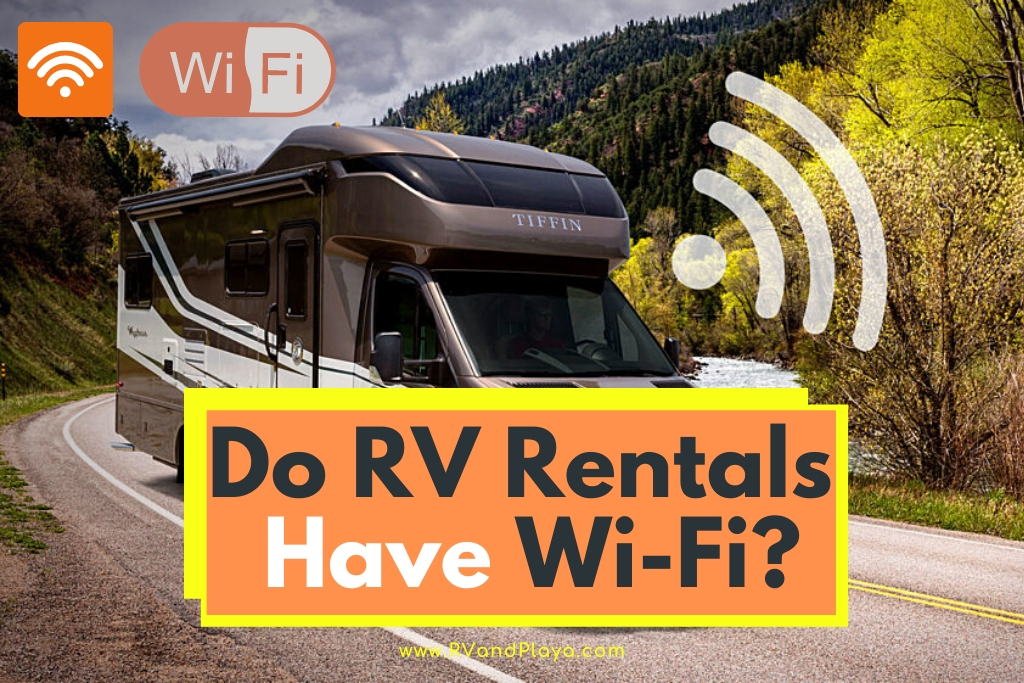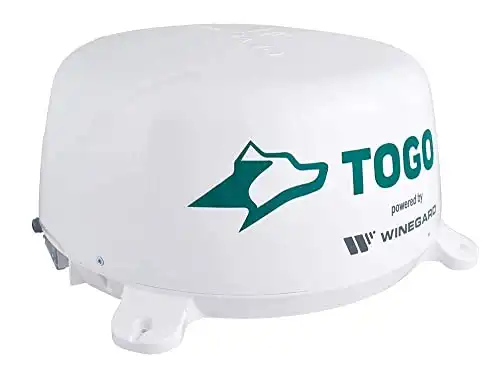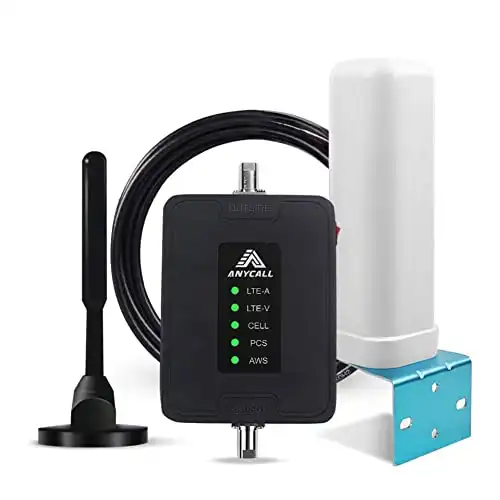Renting an RV is a travel and vacation option that has been growing in popularity for the last couple of decades. It gives you and your family an alternative to the rigid scheduling and logistics of flights, hotels, and rental homes.
There are even some people who work from RVs and live a nomadic lifestyle. Whether for work or recreation, having reliable WiFi access in your RV is a valuable amenity.
Do RV rentals have Wi-Fi? Yes, many RV rentals are jumping on board and offering Wi-Fi to their customers. However, this is a newer improvement that is not offered by all companies. Instead of relying on the RV rental company to provide internet access, it is more convenient to rely on other methods of internet connection, such as using a wireless network device or utilizing a cell phone with internet access.
If you are wondering how to access WiFi in your RV, whether for work or pleasure, look no further. This article will discuss the different methods with which you can get WiFi in your RV – and they are simpler than you would think!
Table of Contents
How Does WiFi Work in an RV?
Understanding how an internet connection works in an area that does not “move,” such as a home or business, is relatively clear. But what happens when you’re on the road with an RV?
If you’re looking for a less permanent solution, then think of WiFi as the data connection on a cellphone, which is one way WiFi can be accessed – by using a cellphone as a miniature hotspot for WiFi.
More permanent solutions, on the other hand, require actual installation of a device similar to the one you might find in your home, such as a satellite dish. These mobile satellite installments will be placed on top of your RV, and the signal will be sent directly from the orbiting satellite above.
Each of these internet connection methods come with their positives and negatives. The best solution is to find an RV that offers WiFi, so you do not have to struggle with mounting equipment or spending extra on a hotspot data plan.
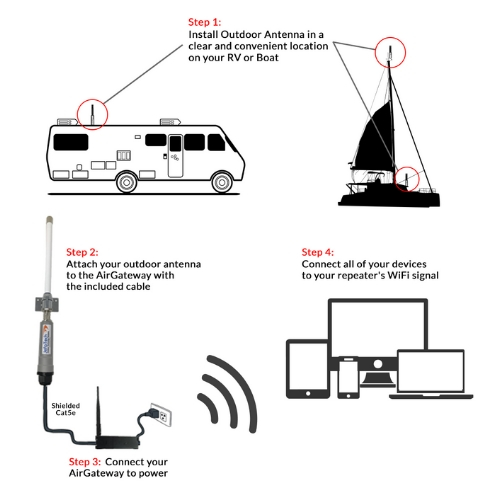
As 5G coverage gets better, staying connected to Wi-Fi while RVing will get easier. Tripod satellites are probably the best option for making sure that you have the very best signal in even the most remote locations.
+ Connect multiple devices, including cell phones, tablets, laptops, and more
+ In-motion and stationary functionality for uninterrupted coverage
+ Connects devices up to 200 feet away from your unit
Mobile hotspots and travel routers are more convenient and more affordable but don’t quite match the level of service that you get from a satellite. However, you can rely on the fact that in our modern world, you’ll probably run into free Wi-Fi at least a couple times each day while you’re on the road.
Reliable Internet In Your RV Without Data Charges >> Check out the video below
Which RV Rentals Offer WiFi?
When you are planning a trip, one of the most convenient ways to ensure that the RV is WiFi-ready is to find a company that offers RV rentals with WiFi. The good news is, depending on where you’re at in the world, getting an RV that is 100% WiFi ready can be as simple as checking a box on your rental application.
Here are a few of the top picks when it comes to RV rental companies that offer WiFi:
There are many small local companies and larger, national networks that provide RV rentals with WiFi capabilities — the key is to find them. Unfortunately, a lot of companies do not offer this information upfront.
If you struggle to find one in your area, there is always the option of going through online portals such as Outdoorsy.com, RVShare.com, and CruiseAmerica.com.
Outdoorsy is the first choice and our recommendation No.1
When renting an RV with WiFi capabilities, pay close attention to the data plans and packages they offer. In some cases, a rental company will charge higher prices than a DIY method. In this case, it might be worth it to find other methods of getting WiFi in an RV.

The upside of getting a rental RV that is ready to go is that you won’t have to do anything but climb in and hit the road. But convenience almost always comes at a financial cost, and in this instance, it is likely that you’ll also pay for the convenience by dealing with limited options to choose from when it comes to service plans and coverage.
5 Best Ways to Get WiFi in an RV
RV renters who want or need to make sure that they have top-notch connectivity while they’re out on the road can skip the hassle of trying to find an RV rental that is ready to go by purchasing equipment themselves. This can be done in four specific ways:
- Purchasing a satellite with an internet plan.
- Using cellular data plans by using a cellphone with WiFi service.
- Purchasing a separate mobile hotspot.
- Planning camping spots and rest stops around opportunities to access Wi-Fi.
The issue with the first option is that roof-mounted satellites for Wi-Fi service can’t be installed on a rented RV. This is because this type of setup requires permanent modifications to the vehicle and semi-permanent mounting of the receiver.
However, you have the option ofpurchasing a tripod satellite system and a service package to use with a rented RV. That would give you complete control over the equipment and service that you use.
In addition to satellite data, you can look into different options that use cellular data to fuel your Wi-Fi data demands. Mobile hotspots and travel routers are great options for most areas of the country and will keep you connected in all but the most remote locations.
If you do not require consistent access to WiFi, then you could consider planning your route to make sure that you find camping sites and roadside rests that allow you to take temporary advantage of their WiFi.
1. Tripod Satellite System
A tripod-mounted satellite system is what the name would lead you to expect. Whether you purchase an off-brand satellite or choose a data provider that supplies a satellite to be used with their service, the tripod is a critical part of the setup.
Many companies offer tripod satellite systems for RVers, including DISH and DirectTV. Companies like this will likely come with a tripod that is designed and manufactured to be used with their satellite dish. You can also find options that will work with a dish right off the shelf.
No matter what route you go to get your receiver equipment, once you have it, you will be able to pull in a signal from almost anywhere — which is the primary advantage of using a tripod satellite system.
If you choose a plan from a data provider that gives you the bandwidth and the coverage that you need, you will be all set. This option takes up space when space can be a precious commodity, but the strength of the signal you’ll get in return makes it more than worth the sacrifice.

One major downside to the tripod satellite system is that some data plan providers require an annual or monthly contract. That makes them less than ideal if you are not planning a long-term vacation or expecting to use the equipment for at least a few weeks out of every month for the duration of the contract.
Some providers offer shorter contracts or pay-as-you-go plans, but their rates tend to be higher.
Related reading: Can You Pressure Wash an RV Rubber Roof? [Practical Tips Inside]
2. Mobile Hotspots
The vast majority of American households have at least one smartphone. Depending on your service plan on the device, you probably already have a mobile hotspot. Most smartphones can be set to serve as a WiFi repeater that will be recognized by your other devices.
It turns the cellular data that you get to your phone into a WiFi signal that laptops, tablets, and other WiFi-enabled devices can use to send and receive data. Plenty of cell phone companies offer this service, which will act as a WiFi provider while on an RV.
If your phone doesn’t give you this option, or you prefer not to tie your phone up in this process, there arededicated mobile hotspots you can purchase. With a separate mobile hotspot device, you have more options such as:
- Using the provider that you currently use for your smartphone.
- Selecting a different provider who can offer you a better deal or better coverage in the area where you will be using it.
In many cases, a dedicated hotspot device can be hard-lined into an antenna or DSL service when they are available. This will give you the most reliable signal possible. The hotspot will serve to strengthen and extend whatever signal you can pick up and allow multiple devices to use the data simultaneously.
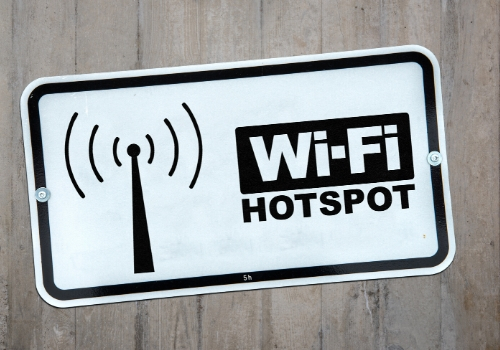
Mobile hotspots are more affordable than satellites and typically require less space for storage during travel. They also tend to offer a wider range of options when it comes to service plans.
The trade-off is that theymight not work as well as satellite equipmentand data plans in the most remote areas that your RVing itinerary will take you.
When choosing a data plan for a mobile hotspot, whether integrated into your smartphone or purchased separately, make sure the plan offers unlimited data.
Otherwise, you may end up with a hefty bill at the end of your trip. Verizon is one of the best companieswhen it comes to hotspots with unlimited data packages.
+ Cell phone signal booster amplifies 4G LTE, 3G and 2G for Truck . compatible with all US and Canadian carriers which include AT&T, T-Mobile, Verizon, Sprint, Straight Talk, U.S. Cellular and many more.
3. Travel Routers
If you have WiFi in your home, then you know what a router is and what it does. Still, you might not know that there are travel routers designed to be more portable and to offer multiple options that ensure that you can make the most of whatever is available wherever your travels take you. You won’t need a plan to go with your travel router, but you will need access to a signal source from somewhere.
As an option for RVing, travel routers offer alternatives to what a mobile hotspot can deliver. A travel router can be plugged into a wired connection the same as any other router.
But when you are on the move or parked in a camping area, they can work as a signal booster on any Wi-Fi signal that is available in your location. Some of the best models on the market can even be used as a mobile hotspot when no WiFi signal is available, but a 4G or 5G data signal is.
Like mobile hotspots, travel routers are a good option when space is limited because they take up a lot less storage than a satellite dish receiver unit will. A travel router can also serve as a battery for charging devices and offer file storage.
Of course, if you use your smartphone as a mobile hotspot, you will get storage and viewing in a single package. Ultimately, the choice between these two options will come down to personal preference and what will give you the best signal in specific locations.
4. Find Camping Spots or Rest Stops with WiFi
If constant connectivity is not what you’re seeking, then struggling with a tripod satellite dish or setting up a mobile hotspot might not be worth the time or effort.
If you have a smartphone that will work as a hotspot, then you’ll be able to receive WiFi signals at most RV camping sites and rest stops. As a bonus, choosing campsites that have free WiFi won’t even tax your phone’s data plan.
Most travel centers that cater to commercial truckers have free WiFi that extends throughout their large parking areas. If you stop there for fuel or hit a fast-food restaurant for a quick meal, you’ll be able to hop online long enough to check emails and stay in touch with the world.
There arealso internet cafes and coffee shops that welcome customers to use their WiFi while they take a break and enjoy a beverage or a snack.
As 5G coverage gets better, staying connected to WiFi while RVing will get easier. Tripod satellites are probably the best option for making sure that you have the best signal in even the most remote locations.
Mobile hotspots and travel routers are more convenient and affordable but do not quite match the level of service that you get from a satellite.
However, you can rely on the fact that in this modern world, you’ll probably run into free WiFi at least a couple times each day while you’re on the road.
5. Consider a WiFi Booster
It can be a struggle to find a signal in an RV — especially when you’re in a more remote location. While a tripod satellite device is reliable almost everywhere, even this handy equipment can slow down in certain areas.
Any avid RVer will suggest purchasing a WiFi booster for an overall better connection wherever you go.
There are many options when it comes to purchasing a WiFi Booster. Some, such as the ALFA Network WiFi CampPro 2 Universal WiFi / Internet Range Extender Kit, sell for over $100 while others sell for less than $50. It comes down to budgetary issues.
If you can, the more expensive model is recommended because it comes with more options for top-notch signal service, no matter where you are or what you’re driving.
Best Internet Providers for RVers
If you find an RV rental that is WiFi-enabled, that might mean that it has a roof-mounted satellite or that it comes with a tripod satellite.
In either case, you will get a great signal almost anywhere, but only while the vehicle is stationary.
Whether the receiver equipment is permanently mounted or carried inside the vehicle until it is ready to be deployed, you will still need a data plan to go along with it.
There are only a few satellite service providers who specialize in offering WiFi service to RVers. That means that when you rent an RV that has ready-to-use WiFi, you’re probably paying for the same data service that you could purchase yourself.
But you might be paying the rental agency a markup for the data service when you could be saving yourself money by purchasing the plan directly.
Some of the satellite signal providers that offer RV service includes:
- HughesNet/Direcway: This company recently launched its state-of-the-art Jupiter 2 satellite that offers customers with a whopping 25mbps x 3mbps speeds. Its quality connection makes it a cinch to watch Netflix or YouTube videos, search through social media, or simply surf the web almost anywhere.
- DISH: Dish is known as being the only company for RVers that offers a “pay as you go” method. This makes it a top choice for anyone enjoying a short-term road trip, where paying a monthly flat rate would be a waste of money. Setup is easy, and they offer high-quality HD to their customers.
- RVDataSet: With the consumer in mind, RVDataSet has created a user-friendly satellite service that offers quality coverage anywhere in the United States. Not only can you indulge in internet access, but the company also provides an option for streaming television at a low cost, too.
Keep in mind that DISH is not only the sole company that offers pay as you go plans, but they are the only company to offer internet and television with a single satellite.
Other companies will require purchasing further satellites and paying extra for dual services.
Cost for a Portable WiFi Hotspot
In the table below you can find a list of the most popular prepaid mobile hotspot plans. The table include the device costs and the monthly/data costs:
| Portable WiFi Hotspot Provider | Plan Cost | Hotspot Device Cost | Network Used | Notes |
|---|---|---|---|---|
| AT&T hotspot | $25/mo: 2GB $50/mo: 5GB $75/mo: 8GB | Varies. $0+ | AT&T 4G LTE, 3G | Pre-paid option called “AT&T PrePaid Mobile Hotspot”. Additional data added at varying prices. |
| Karma hotspot | $3/month + $10/1GB used No Expiry OR $39.99/mo: 5GB $79.99/mo: 10GB $99.99mo: 20GB | Karma Go: varies | Sprint 4G LTE, 3G | If you’re a heavy data user, Karma is an attractive offering. |
| FreedomPop hotspot | $0/mo: <500MB $19.99: 2GB $28.99: 3GB $34.99: 4GB $39.99: 5GB $74.99: 10GB | Varies. $0 | 4G | Data is supported in many countries. |
| Boost Mobile hotspot | $25/mo: 1.5GB $50/mo: 10GB | ZTE Warp Connect: $49.99 | Sprint 4G LTE, Enhanced LTE | Connect up to 10 devices. |
| Net10 hotspot | $10/14 days: 500MB $20/mo: 1GB $30/mo: 2.5GB $50/2 mo: 5GB | ZTE: $29.99 | Varies 4G LTE | Net10 is a Tracfone owned company and ru |
Conclusion
Staying connected to the internet while traveling in an RV is not as complicated as it may seem. There are a variety of options for travel, whether they require constant connection or just want to check their emails here and there.
The top choice is to utilize an RV rental company that offers RVs installed with satellites or considering a tripod satellite with a data plan.
You can also use the mobile hotspot available on almost any smartphone from Verizon to Cricket devices.
Some people might think that it’s silly to be preoccupied with staying connected while camping in a vehicle that is designed to let you get away from it all.
At the same time, it’s important to acknowledge all of the reasons that people might want to rent an RV.
As we noted earlier, there are folks who work remotely and live the life of a digital nomad. For them being able to work while they travel is essential.
There are also a lot of folks who rent RVs for events like music festivals, auto races, and other sporting events.
Frequently Asked Questions
Here are a few common questions people often have about WiFi:
What is the best satellite dish for RV?
We’ve identified three of the best satellites the best satellite dish for RV:
2) KING VQ Series and
3) Satellite Oasis Satellite Tripod Kit.
All these 3 are available for DISH and DIRECTV
Can I use my home dish receiver in my RV?
Yes you can! All you have to do is to purchase a DISH Mobile Wally HD Receiver and compatible antenna, then you can add your new receiver directly to your existing account.
What is the best WIFI for an RV?
We’ve identified three of the best satellites the best satellite dish for RV:
1) Bearifi BearExtender (Indoor and Outdoor)
2) Securifi Almond Wi-Fi Router and Range Extender (Indoor)
3) Winegard ConnecT 2.0 (Outdoor)
4) Alfa Camp Pro 2 Kit (Outdoor) and
5) Halo Wi-Fi Extender System (outdoor). All these 5 are available on Amazon.
Sources:
http://www.rversonline.org/RVMFHSE.html
https://rvshare.com/enterprise-rv-rental
https://www.generalrv.com/rv-rentals/faq#q19
https://www.usatoday.com/story/travel/advice/2016/06/19/wi-fi-mobile-hotspot/86022780/
https://www.lifewire.com/top-travel-wireless-routers-2377742
https://www.jucy.com/nz/en/about-us/useful-stuff/get-wifi-on-the-road/#tab-panel-26
Recent Posts
Is Toyota Remote Connect Free? (Subscription, Services Plans)
Does Toyota Remote Connect have an included trial? It used to be the case that, when you bought a new car, you made one straightforward payment and that was it. Now, it feels like there are...
Toyota Safety Connect: What It Is And Why You Need It? Whether you’re buying a new Toyota or you’ve had one for a while you will have been given the hard sell on their Connected Services but do...

